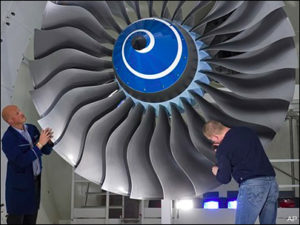British Airways and Rolls-Royce will begin work on validating 10 different alternative fuel programs this year, with the hope of completing work on the initiative by early 2012.
The two last year launched a new call to fuel suppliers to provide 60,000 liters of fuel for testing. A similar initiative failed due to a lack of responses, but this time, 17 suppliers responded saying they could meet the criteria, BA CEO Willie Walsh told an Imperial College London green aviation forum.
The airline and Rolls will examine 10 of those in a laboratory environment in the next few months, with rig tests of about five fuels due in the second quarter, followed by full engine tests using two fuels in the second half.
Walsh notes that the progress made in biofuels in recent years suggests they can contribute more than first thought in terms of helping airlines reduce their C02 emissions. “I’ve become much more excited” about the prospect of such fuels, he notes.
The airline also is sponsoring research with Cranfield University to investigate algae fuels. The first commercial volumes of those types of fuels could be operationally viable in three years, Walsh believes.
[ad]
In parallel, BA is working with U.S. company Solena to build a facility in London to convert household waste to fuel. Qantas has a similar plan to convert biomass into fuel in Australia (Aviation Daily, Jan. 6). The goal is to produce 160,000 million gallons of biofuel with a life-cycle cost that is 95% below that of kerosene today. Walsh notes the fuel also burns cleaner and promises lower emissions of NOx, sulphur and soot. “We believe this fuel can be produced commercially at a price that is competitive with kerosene,” Walsh says.
Fuel from the facility should start being available in 2014, although the quantity still represents only around 2% of the airline’s total fuel bill.
Meanwhile, BA also is preparing for next year’s European inclusion of aviation in its emissions trading system. “We are already buying carbon credits,” Walsh says.
Source and thanks Aviation Week


